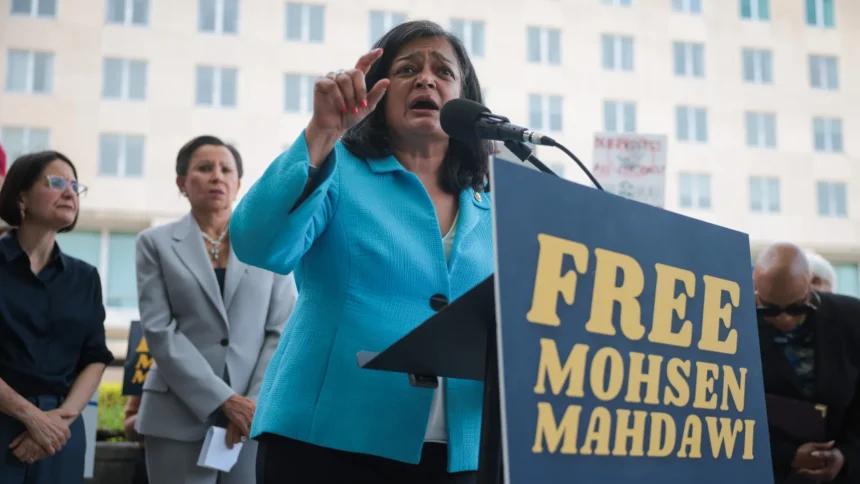Washington, D.C.: Indian-American Congresswoman Pramila Jayapal is leading a congressional inquiry into the Trump administration’s abrupt cancellation of hundreds of student visas, demanding accountability for a decision that has upended the lives of international students and sown fear across U.S. university campuses.
Jayapal, who represents Washington’s 7th Congressional District, sent a strongly-worded letter—co-signed by over 130 House Democrats—to both the Department of State and the Department of Homeland Security (DHS), seeking clarification on the legal grounds for revoking student visas and withdrawing legal immigration status mid-academic year.

Unprecedented Visa Chaos and Legal Fallout
The letter comes amid reports that hundreds of students lost their visas and thousands were flagged in the Student and Exchange Visitor Information System (SEVIS), often without due process. Many affected students were near graduation and have now been forced into legal limbo, with nearly 100 lawsuits filed nationwide to contest the government’s actions.
“This appears to be an attack on student visa holders writ-large, and not just on those who hold policy positions with which the administration disagrees,” Jayapal wrote. She accused the administration of politically motivated immigration enforcement and warned that “university campuses are being transformed into places of fear rather than learning.”
Mounting Detentions and Uncertain Futures
Even after some visa revocations were reversed in federal immigration databases, many students remain in immigration detention, while others fear further actions. According to the DHS, at least one student has already self-deported due to visa status uncertainty.
Jayapal’s inquiry also targets the opaque criteria used for visa revocations. Reports suggest some students were flagged for participating in peaceful campus protests or being listed in the National Crime Information Center (NCIC)—despite many of these charges being unproven or dismissed.
Impact on U.S. Universities and Global Reputation

The crackdown on international students could severely impact U.S. universities, which depend on tuition and global talent. Jayapal warned that such actions erode trust in the American higher education system, potentially driving students to more welcoming countries like Canada or the UK.
The Trump administration has claimed it is developing a new, more secure visa system and will suspend further SEVIS changes until it is implemented. However, for students caught in the crosshairs, this provides little reassurance.
WHAT LIES AHEAD FOR INTERNATIONAL STUDENTS
It all began when visas of several hundred students were revoked, and thousands had their legal statuses withdrawn in the Student and Exchange Visitor Information System (SEVIS). SEVIS assists schools in verifying the immigration status of students so they can go to class or do research.
The government revoked student visas, alleging that some of the students participated in campus protests or were listed in the National Crime Information Centre database, despite the fact that some of these charges had been dismissed or were never established.
In court, the government stated that it is developing a new system and will refrain from making additional changes to students’ status in the SEVIS database until its implementation.
Jayapal is concerned that the uncertainty of visa status will hurt U.S. universities. As Trump administration immigration arrests mount, numerous students are uncertain about their future in the US. At least one student has already self-deported, according to the Department of Homeland Security.
Who Is Pramila Jayapal?
Rep. Pramila Jayapal is the first Indian-American woman elected to the U.S. House of Representatives. Born in Chennai, India, she has become one of Congress’s most vocal advocates for immigrant rights. As the Ranking Member of the Subcommittee on Immigration Integrity, Security, and Enforcement, Jayapal continues to champion progressive immigration reform, student protections, and justice in federal enforcement practices.
This latest confrontation over student visas underscores her broader mission to ensure America remains a welcoming place for students, researchers, and future leaders from around the world.









